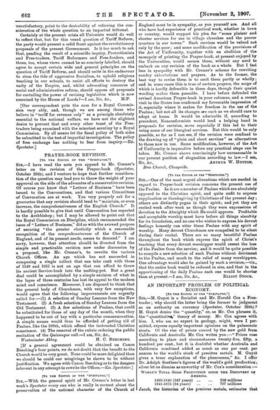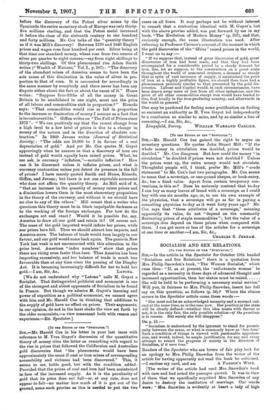AN IMPORTANT PROBLEM OF POLITICAL ECONOMY.
[To THE EDITOR Or THE "8PECTATOR:1 Sin,—M. Guyot is a Socialist and Mr. Harold Cox a Free- trader ; why should the latter bring the former to judgment as an authority on currency (Spectator, October 26th) ? M. Guyot denies the "quantity," or, as Mr. Cox phrases it, the " quantitative," theory of money. Mr. Cox agrees with him. I, who am no expert in geology, might, were I per- mitted, express equally important opinions on the palaeozoic strata. Of the rise of prices caused by the new gold from California and Australia Mr. Cox writes you :—" Prices rose according to place and circumstances twenty-five, fifty, a hundred per cent., but it is doubtful whether Australia and California combined added as much as one per cent, per annum to the world's stock of precious metals. M. Guyot gives a truer explanation of the phenomena," &a. I offer Dr. Adolph Soetbeer's figures of the world's gold production; silver let us dismiss as unworthy of Mr. Con's consideration WORLD'S TOTAL GOLD PRODUCTION SINCE TEE DISCOVERY Olt
AMERICA.
1493-1840 (347 years) ... 658 millions 1841-1875 (34 years) ... ... 707 millions
Jacob, the historian of the precious metals, estimates that before the discovery of the Potosi silver mines by the Spaniards the entire monetary stock of Europe was only thirty- five millions sterling, and that the Potosi metal increased it before the close of the sixteenth century to one hundred and forty millions. Mr. Cox talks of the "quantity theory" as if it was Mill's discovery! Between 1570 and 1640 English prices and wages rose four hundred per cent. Silver being at that time our etandard money, wheat rose from two ounces of silver per quarter to eight ounces,—say from eight shillings to thirty-two shillings. Of this phenomenal rise Adam Smith writes (" Wealth of Nations," Vol. I., p. 107) : "The discovery of the abundant mines of America seems to have been the sole cause of this diminution in the value of silver in pro- portion to that of corn. It is accounted for accordingly in the same manner by everybody and there never has been any dispute either about the fact or about the cause of it." Hume writes : "Suppose four-fifths of all the money in Great Britain to be annihilated in one night, must not the price of all labour and commodities sink in proportion ?" Ricardo 'says : "That commodities would rise or fall in proportion to the increase or diminution of money I assume as a fact that is incontrovertible." Giffen writes on "The Fall of Prices since 1873 " : "We can positively say that the recent change from a high level to a low level of prices is due to a change in money of the nature and in the direction of absolute con- traction." In 1869 Jevons writes (Journal of Statistical Society) : "The odds are 10,000 to 1 in favour of a real depreciation of gold." And yet Mr. Cox quotes M. Guyot approvingly when he assures us that a discovery of iron ore instead of gold would equally have raised prices. What, let me ask, is currency "inflation,"—metallic inflation ? How can it be discerned unless it inflates prices, and what is currency contraction unless you detect its presence in the fall of prices? I have merely quoted Smith and Hume, Ricardo, Giffen, and Jevons ; but there is not one reputable economist who does not affirm the quantity theory. As Mill said of it, "that an increase in the quantity of money raises prices and a diminution lowers them is the most elementary proposition in the theory of the currency, and without it we should have no clue to any of the others." Mill meant that a writer who questions this theory must be in black impalpable darkness as to the working of the foreign exchanges. For how do the exchanges act and react ? Would it be possible for, say, America to draw all our gold and retain it ? Of course not. The mass of the gold imported would inflate her prices, while pm- prices here fell. Thus we should attract less imports, and America more. The balance of trade would turn largely in our favour, and our gold would come back again. The panic in New .York last week is not unconnected with this alteration in the price level. American "index numbers" show that prices there are rising even faster than here. Thus America has been importing excessively, and her balance of trade is much leas favourable than at any time since the passing of the Dingley Act. It is becoming increasingly difficult for her to hold her [We do not understand why "Latona" calls M. Guyot a Socialist. That distinguished publicist and economist is one of the strongest and ablest opponents of Socialism to be found in France. But though we admire M. Guyot's learning and power of exposition as a political economist, we cannot agree with him and Mr. Harold Cox in thinking that additions to the supply of gold have no effect on prices. Their arguments, in our opinion, do not in the least shake the view set forth by the older economists,—a view consonant both with reason and experience.—ED. Spectator.]































































 Previous page
Previous page